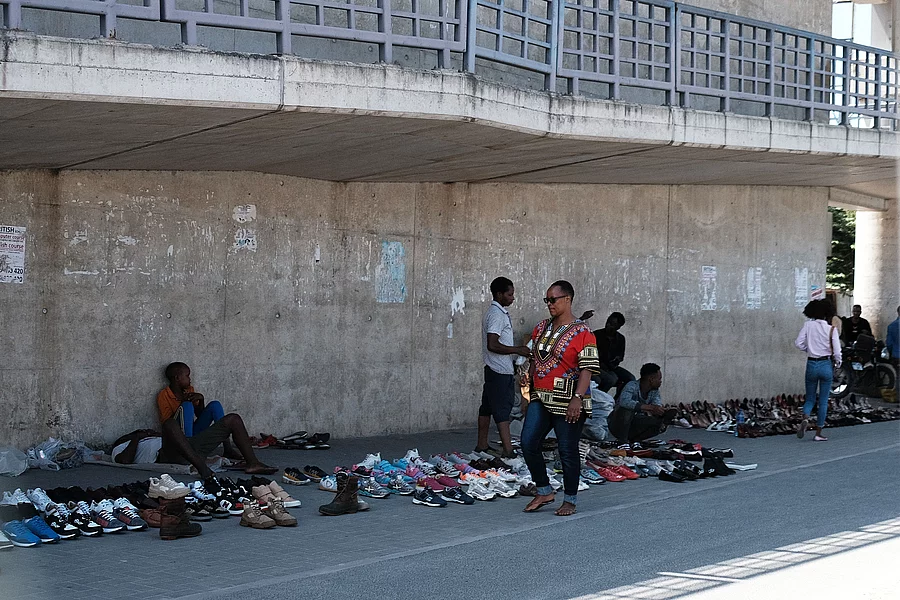
Welcome to Kazi The Podcast Series
This podcast series offers a comprehensive exploration of the daily experiences of Tanzanian workers, shedding light on the crucial challenges they encounter. With a focus on issues like gender equality, climate change, and technology, the series delves deep into the world of work. Each episode provides valuable insights and foster a better understanding of the diverse issues impacting people at work in Tanzania. By shedding light on these vital topics, the series aims to initiate constructive discussions and promote positive and new narratives about transformative action towards improving lives of workers across the region.
Listeners can expect an engaging and informative journey through the lives of Tanzanian workers, as the podcast endeavors to highlight their dedication, and resilience. The use of Swahili as the primary language ensures accessibility to a wider local audience, fostering a strong connection with the listeners. Whether you are familiar with the Tanzanian context or new to it, this podcast promises to offer valuable perspectives and enriching content for all.
Episodes
E09: Dar es Salaam on Wheels: Gender and Labor in the Bodaboda Sector
What do labor and livelihoods look like in Tanzania’s informal transport sector? In this episode, we explore the bodaboda industry in Dar es Salaam through the lens of new FES research, unpacking the lived realities of drivers, gender dynamics, and the challenges of regulatory reform. Featuring insights from Dr. Michaela Collord and Nice Amon, this is a deep dive into the politics, potential, and future of informal mobility in African cities.
E08: From Education to (Un)Employment: Why Tanzanian Youth Struggle to Find Decent Work
In this episode, we unpack why Tanzanian youth, despite being more educated than ever, still struggle to find decent work. From unfair job requirements to broken systems, from entrepreneurship hurdles to disability exclusion, we’re talking to the people living it and changing it. Featuring: graduates, entrepreneurs, disability advocates, trade unions & youth-led organizations.
E07: Tanzania's Wage Puzzle: Navigating Inflation and Negotiation Dynamics
The cheers of May Day still echo—President Samia’s announcement of a 35.1% minimum wage increase for public sector workers sent waves of excitement through Tanzania. But beyond the celebration, what does this really mean for workers, especially those in the private and informal sectors?
In this thought-provoking episode of Kazi the Podcast, hosts Sam Gidori and Venance Majula dive deep into the realities behind wages, inflation, and labor policies. With insights from key experts—Dr. Joseph Mwinulla, labor economist; Willy Kibona, TUICO representative; and Jonathan Karuguru, consultant for street vendors—we explore salary structures, trade unions’ role in wage negotiations, and the pressing need to protect informal sector workers. And as the world of work rapidly shifts with technological advancements like AI, we ask: Are workers prepared for the transformation? Will automation revolutionize productivity—or threaten livelihoods?
This episode is packed with powerful perspectives, crucial debates, and forward-thinking discussions on the future of labor in Tanzania. Tune in now to stay informed, empowered, and ready for change! Available on Apple Podcasts, Spotify, SoundCloud, YouTube Music, and more.
E06: Balancing Profit and People: Business and Human Rights in Tanzania
What does it mean for the future of work to have human rights in business? In this episode of our podcast, "Balancing Profit and People: Business and Human Rights in Tanzania," we delve into this critical question with Jovina Muchunguzi from the Commission for Human Rights and Good Governance (CHRAGG) and Gaston Kikuwi from VIBINDO. They discuss the government's progress toward developing a National Action Plan (NAP) on Business and Human Rights and the challenges of policy implementation. The episode also sheds light on the roles of CHRAGG and VIBINDO in supporting small business owners, offering education and legal assistance to ensure that human rights are respected across Tanzania's business landscape.
E05: Platform work and digital transformation of the transport sector in Tanzania: Opportunities & Challenges
In this episode of Kazi the Podcast, we explore how digital technologies are reshaping the world of work, with a special focus on the ride-hailing sector in Tanzania. As digital platforms become more integrated into everyday services like transport, the conversation shifts to the workers who keep these systems running. We dive into the experiences of motorcycle taxi drivers, hearing firsthand about the opportunities and challenges they face in this digital landscape. With insights from Baker Khundakji of the International Transport Workers Federation, Kenji from Bolt's operations team, and Nice Amon of the Communications and Transport Workers Union of Tanzania (COTWU-T), we examine the realities, risks, and potential of ride-hailing services, as well as the policies in place to protect the rights of workers.
E04 - Exploring Decent Work: Unpacking International Labour Conventions in Tanzania (May Day Edition)
In this International Workers Day, we delve into the significance of international labor conventions within Tanzania. We discuss how these conventions translate into national laws, policies, and regulations, providing a comprehensive framework to eliminate harassment and violence in workplaces, strengthen social dialogue, and promote decent work for all Tanzanians. Tune in to learn how these efforts contribute to sustainable development and harmonious workplaces in Tanzania!
E03: Breaking Barriers: Sealing the Gender Pay Gap in Tanzania (IWD Edition)
Join Kazi the Podcast in a powerful conversation with the inspiring Mama Gemma Sware Akilimali and Dr. Kassim Meja Kapalata on International Women's Day. Together, we delve into the urgency of closing the gender pay gap, empowering women to reach new heights in their careers, shattering stereotypes, and fostering a community and economy where equality reigns. Tune in for a dialogue that celebrates the potential of women in the workplace.
E02: Sexual Harassment in Workplaces: Understand Its Impact, Take Action
In today's contemporary workplace, the pervasive issue of sexual violence looms ominously over professional settings. This distressing problem encompasses a broad spectrum of unwelcome sexual behaviors, ranging from verbal harassment to outright assault. Its repercussions extend far beyond the immediate incident, fostering power imbalances and cultivating hostile work environments that often leave victims with enduring physical and psychological wounds.
On this International Day for the Elimination of Violence Against Women, Kazi the Podcast sheds light on this often unspoken yet ever-present menace. We aim to emphasize the importance of open dialogue regarding this issue within workplaces and provide guidance on how to respond if you find yourself confronted by such a situation.
E01 - Discovering Trade Unions: A Tanzanian Perspective
For over 90 years, Trade Unions have played a vital role in safeguarding and advocating for the rights of workers in Tanzania. These unions serve as a crucial link between employees, employers, and the government to ensure improved working conditions and the well-being of all workers. Despite their commendable efforts, it is evident that the hard work of union members has not received the recognition and appreciation it deserves.
In this inaugural episode of Kazi the Podcast, we delve into the origins of Trade Unions, tracing their roots back to Europe and their evolution in Tanzania. We explore their significant contributions and their growing relevance in today's rapidly changing work environment, shaped by technological advancements.
Karibu KaziThePodcast
The views expressed in the podcasts are not necessarily those of Friedrich-Ebert-Stiftung.
Team
Producer
Content Advisor
Communications & Design
-
Venance Majula
Communications & Design
-
Upendo Ngumba
Communications & Design


